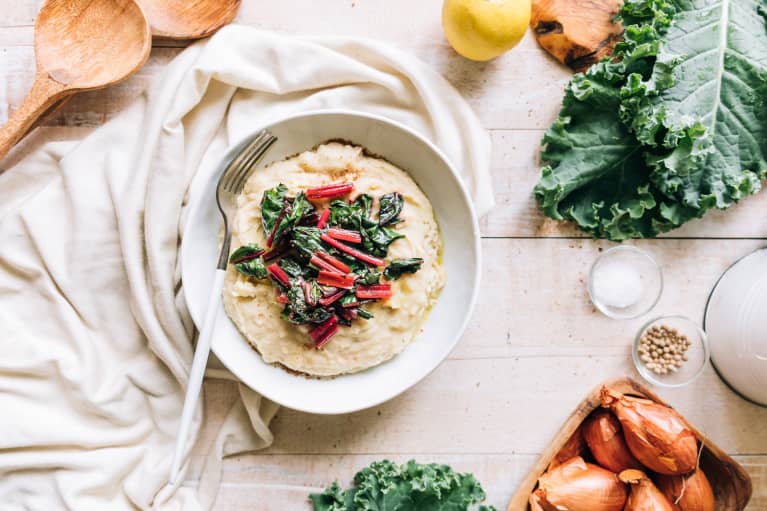
If I had a cashew for every time I heard the old “I’d like to go vegan, but it’s just so expensive” excuse, I’d be bathing in cashew cream. There’s a pervasive myth that a vegan diet is not only more expensive and complicated than the standard American diet but that you need to do all your grocery shopping in special organic-only health food stores or from the dedicated vegetarian fridge at your local supermarket (the “but my supermarket doesn’t have vegan options” excuse is another one that drives me up the wall).
It’s easy to see how many people perceive veganism as expensive. For those who are transitioning from a standard American diet toward a plant-based one, the fake ground meat crumbles and vegan cheeses often seem like the easy way to eat less meat while still cooking your favorite and familiar recipes—but these products areexpensive, and if you base your diet around them, the costs will quickly add up.What’s not true, however, is that your supermarket doesn’t have vegan options. The pillars of a healthy, hearty, and delicious vegan diet are beans, rice, and vegetables (and maybe nutritional yeast and bananas). These can be some of the cheapest items in your supermarket, and—as I do in all my recipes—you can doctor them up with seasonings, sauces, and cooking methods that make them anything but boring. Seriously, you’ll never look at a chickpea the same way again—chickpea breakfast sandwich, anyone?
Here, I’m going to give you some of my favorite money- and time-saving tips and tricks for eating a healthy, delicious vegan diet on a budget. Many of them may seem obvious because they are—grocery shopping and food prep are not rocket science. But if you’re looking to reduce your grocery bill and save time in the kitchen, you might need to change some habits and approach shopping and cooking a bit differently.
1. Learn how to really cook with vegetables.
Yes, you can make a hearty and satisfying meal for the whole family without following the “meat and two veg” formula—you just need to have a few recipes under your belt. Follow vegan food blogs, join vegan social media groups, and check out a few vegan cookbooks at your local library. Try recipes you’ve never tried before, try the veggie dishes at your local restaurants, and, most important, keep an open mind. You think you hate tofu or tempeh now? Just wait till you’ve tried it coated in arrowroot powder, pan-fried until crispy, and bathed in a delicious sauce! (This tempeh and broccoli stir-fry will make you a believer.)
2. Buy in bulk.
This one is a no-brainer. Bulk food stores and the bulk food section of supermarkets are almost always cheaper for beans, pasta, flours, nuts, seeds, and grains than prepackaged products. Also, if you’ve got a recipe for an unfamiliar ingredient, you can buy exactly what you need rather than risk buying an entire package that just sits in your cupboard taking up space.
3. Get to know your local Asian and Latin American markets.
Asian markets are great for big blocks of tofu, rice, noodles, soy sauce, miso, and coconut milk. Latin American markets have a great selection of beans, chile peppers, tortillas, and sauces. Indian markets will blow your mind with the variety of spices offered. And you’ll find all of these items at better prices than supermarkets.
4. Don’t discriminate against frozen vegetables.
I know, this one can be hard. Fresh veggies taste fresh and look nice, and frozen ones just seem like the lower-quality option. But science says that frozen veggies are just as nutritious as fresh (they’re picked at peak ripeness and flash-frozen to preserve all that nutrient-rich goodness), available year-round even when they’re not in season, and you don’t have to worry about them rotting in a week, and even organic options are almost always cheaper. Best of all, frozen vegetables save you time. No need to wash, peel, and chop them—it’s already been done for you. They’re perfect for whipping up a quick stir-fry and make a great addition to grain bowls.
5. Grow it yourself.
I’m a big proponent of growing your own. It doesn’t matter how little space you have. I live in an apartment with no balcony, and I still manage to grow a small variety of vegetables. Herbs and salad greens are super easy to grow in pots and need next to no space (just Google “container gardening”). Sprouts are even easier (and great for brain and overall health); you need no special equipment other than a jar, and they’re ready to eat in just a couple of days. If you’ve got a patio or a backyard, try your hand at tomatoes and peppers—they’re guaranteed to be the most delicious you have ever tasted!
Based on an excerpt from 30-Minute Frugal Vegan Recipes by Melissa Copeland, with permission of Page Street Publishing. Copyright © 2019.
Disclaimer: We at Prepare for Change (PFC) bring you information that is not offered by the mainstream news, and therefore may seem controversial. The opinions, views, statements, and/or information we present are not necessarily promoted, endorsed, espoused, or agreed to by Prepare for Change, its leadership Council, members, those who work with PFC, or those who read its content. However, they are hopefully provocative. Please use discernment! Use logical thinking, your own intuition and your own connection with Source, Spirit and Natural Laws to help you determine what is true and what is not. By sharing information and seeding dialogue, it is our goal to raise consciousness and awareness of higher truths to free us from enslavement of the matrix in this material realm.
 EN
EN FR
FR


























For Josefien….My sister told me about a book called the Plant Paradox by Steven R Gundry that talks about night shades and beans having lichens or something like that. He says that you have to pressure cook these vegetables to get rid of the lichens that cause leaky gut in humans. I haven’t got the book yet, but I did get the pressure cooker!
Lettuce, onion, cucumber, tomato, potato, peas, brown bread and coconut milk for me with herbs and plant based supplements – yummy ! been on this diet for over six years and counting – all items locally available all year and eaten out (no cooking facilities) so no waste or washing up and cheap (low income). Each to his own Josefien ; i grew up on meat but was advised to discontinue for medical/health reasons by my Doctor over 29 years ago – i do miss liver and onions though.
Plant based diet made me really sick. Arthritis, eczema, tired all the time and very depressed. I eat meat now and I feel great, happy, lots of energy, no more need for naps. Be aware, veganism is part of the depopulation agenda.
B.t.w. I am NEVER sick.
Thank you! I decided some years ago that I use max. 5 ingredients (incl. things like salt) for cooking. A few years ago I was in the library where I read a cooking magazine. Believe it or not, for one recipy they had half a page (size A3, twice A4) of ingredients. That’s where I stopped being interested. When I eat alone I don’t hesitate to eat food just out of a tin. No cooking, no dishwashing, no nonsense. We eat to stay alive as long as we don’t make it to totally living without and only need prana.